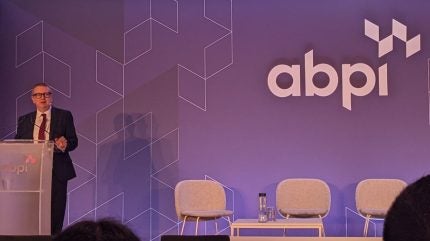
Leaders of the Association of the British Pharmaceutical Industry (ABPI) say the UK Government must address rising clawback rates on drug sales if innovation and investment are to maintain the country’s ambition to become a life sciences powerhouse.
“We need a resolution to the VPAG crisis to underpin a successful ten-year plan”, said Richard Torbett, ABPI chief executive.

Discover B2B Marketing That Performs
Combine business intelligence and editorial excellence to reach engaged professionals across 36 leading media platforms.
Torbett gave the opening talk at the 2025 ABPI conference in London on 3 April, where he warned the scheme’s current payback rates threaten the UK’s competitiveness and investment prospects in life sciences.
The voluntary scheme for branded medicines pricing, access, and growth (VPAG) is an agreement between the UK Government and the pharma industry stipulating an annual National Health Service (NHS) budget for medicine purchases, over which companies pay back a percentage of sales to the NHS. Payback rates for new medicines, initially set at 15.3% for 2024, unexpectedly rose to 22.9% in 2025, sparking widespread industry concern.
Torbett noted the extra £22bn ($28.9bn) pledged to the NHS as the primary driver behind the rate increase, but warned the move had rendered the VPAG scheme unfit for purpose and risked driving away investment from UK medicine and vaccine development. Crucially, he said resolution to what he termed a “VPAG crisis” would be essential to fulfilling Secretary of State for Health and Social Care Wes Streeting’s ten-year plan to reform the country’s healthcare system, set to be published in early 2025.
Following Torbett was the ABPI’s acting president Russell Abberley, who echoed Torbett’s concerns, citing a recent ABPI report claiming the current scheme made the UK “uninvestable”. However, Abberley maintained optimism in the county’s life sciences potential, stating: “There is so much more that we can do to ensure the UK becomes logical, and certainly a lot more that we can do to become the unrivalled, choice for global R&D investment.”

US Tariffs are shifting - will you react or anticipate?
Don’t let policy changes catch you off guard. Stay proactive with real-time data and expert analysis.
By GlobalDataBeyond investment, Torbett also highlighted the need for the UK to rekindle its clinical trial sector to become “a beacon for research investment”. In 2022, clinical trials brought in £7.4bn for the UK, including £1.2bn directly from NHS revenue and with 65,000 jobs generated, according to Torbett.
But Torbett said that due to an estimated 40% drop in clinical activity since 2017, the country’s economy has lost out on around £3bn per year of revenue, half a billion of which would have come through the NHS. Refitting the healthcare system to accommodate clinical research, he said, would work in parallel with VPAG reform to restore competitiveness to UK life science and pharma.




